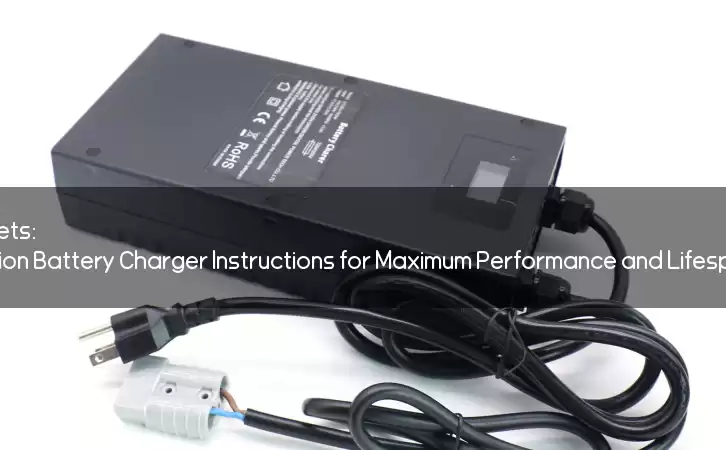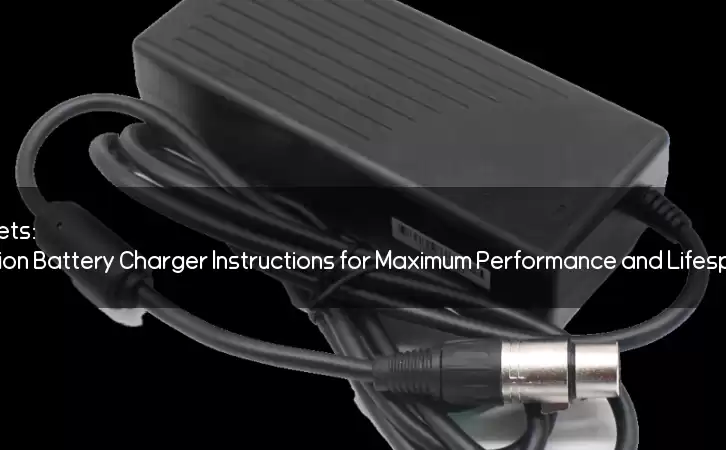Information Center
Unlock the Secrets: Mastering Li-ion Battery Charger Instructions for Maximum Performance and Lifespan
Published:2023-05-14 19:33:13 Author:Green WCND Views:94Li-ion Battery Charger Instructions: Tips and Tricks for Optimal Performance

Li-ion batteries have become the preferred choice for most electronic devices, thanks to their high energy density, compact size, and long shelf life. From smartphones to laptops, power tools to electric cars, Li-ion batteries power our daily lives. But as with any rechargeable battery, the charging process is critical to ensure optimal performance and longevity. In this article, we will provide some essential tips and tricks for Li-ion battery charger instructions.

1. Choose the Right Charger: Not all chargers are created equal. Li-ion batteries require a specific charging voltage and current, which can vary depending on the battery chemistry and size. Always use a charger that is designed for your particular device and battery type. Using an incorrect charger can damage the battery and reduce its lifespan.
2. Charge at the Right Time: Avoid charging the battery when it is hot or cold. Extreme temperatures can damage the battery or shorten its life. For best results, charge the battery when it is at room temperature.
3. Charge to the Right Level: Li-ion batteries should not be overcharged or undercharged. Overcharging can cause the battery to heat up and reduce its capacity, while undercharging can lead to irreversible damage. Always aim to charge the battery to around 80% of its maximum capacity to extend its lifespan.
4. Avoid Interruptions: Interrupting the charging process can cause the battery to discharge rapidly, reducing its capacity. Try to avoid using the device while it is charging, and let it charge fully before unplugging it.
5. Store the Battery Correctly: Li-ion batteries should be stored in a cool and dry place, away from direct sunlight and heat sources. Avoid storing the battery for long periods without use, as this can cause self-discharge and reduce its capacity.
6. Replace the Battery When Necessary: Li-ion batteries have a limited lifespan, typically around 500 charge cycles. If the battery starts to lose its capacity or fails to hold a charge, it may be time to replace it. Always use a genuine replacement battery, as third-party batteries can be of inferior quality and potentially dangerous.
In conclusion, Li-ion battery charger instructions are crucial to ensure optimal performance and longevity. Follow the above tips and tricks to keep your Li-ion battery in top condition and extend its lifespan. By choosing the right charger, charging at the right time and level, avoiding interruptions, storing correctly, and replacing the battery when necessary, you can enjoy the full benefits of Li-ion technology.
Power Adapter Design and Customization Guide for Portable Electric KettlesI. Common Design Types for Portable Electric Kettle Power AdaptersPortable electric ke···
I. Common Design Types of Power Adapters External Independent Type (Most Common) Design: A standalone adapter (e.g., "black brick") connected to the p···
Handheld Vacuum Cleaner Power Adapter Selection GuideIntroductionHandheld vacuum cleaners have become a mainstream tool for household cleaning due to their port···
Drill Power Adapter Selection Guide.drill-container { font-family: Arial, sans-serif; line-height: 1.6; max-width: 800px; margin: 0 auto; padding: 20px; } .dril···





